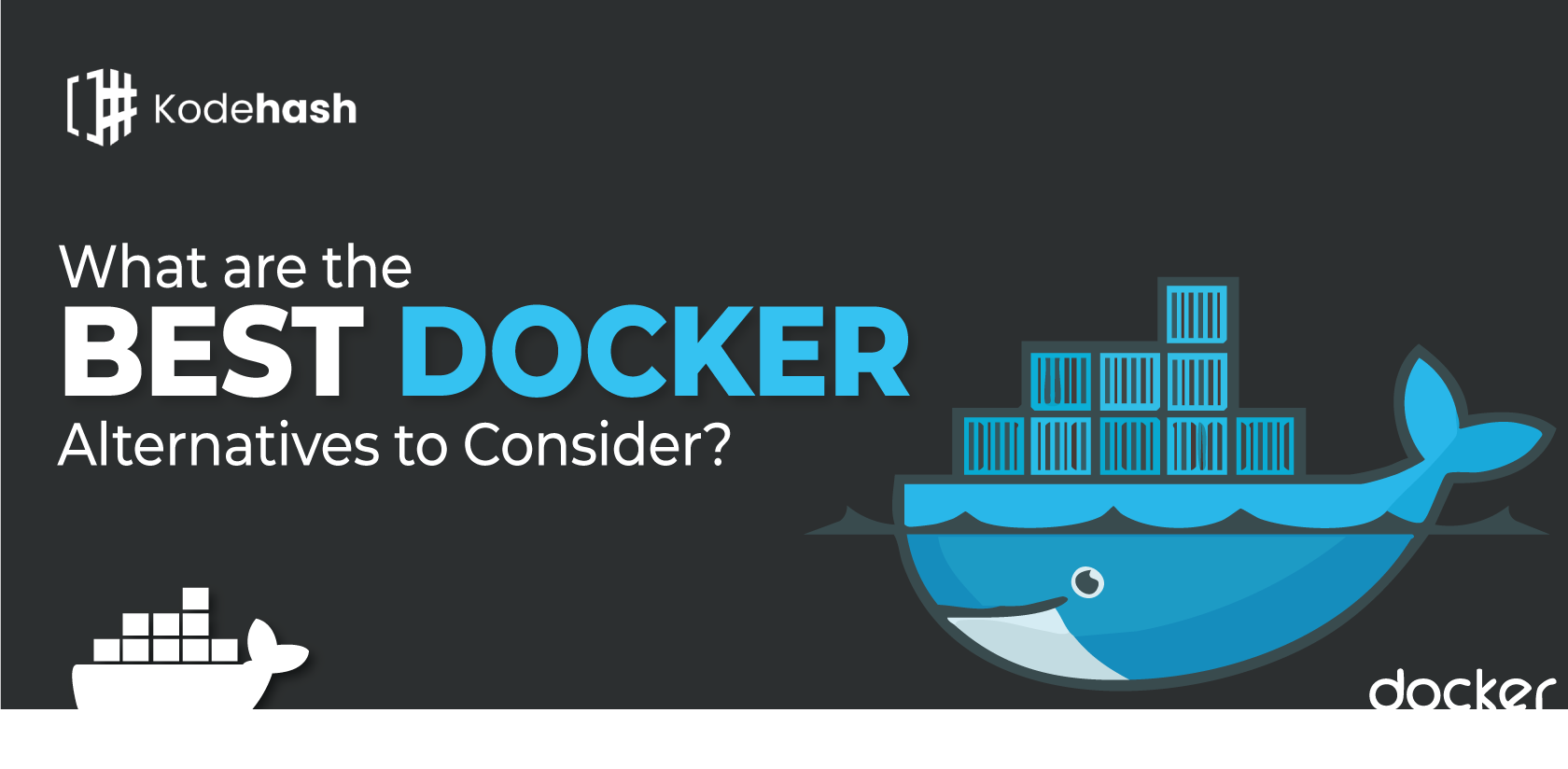What are the Best Docker Alternatives to Consider?

Although Docker is a significant platform for containerization, several other choices are available to meet the diverse needs of users. The best Docker alternatives are inclusive of Buildah, runC, Containerd, Podman, etc. While they extend the ease of containerization, they provide users with a number of features as well. Through these alternative options, they can build images, synchronize with the Docker hub, skip rootless builds, and do more. Associated with these are different features, making various processes easier for users. To avail of these features and benefits, one can consider finding out which substitute is the best for containerization and other processes.
Top 7 Docker Alternatives for Seamless Containerization
Buildah, Buildkit, Podman, runC, and several others can serve as alternatives to Docker. Some of these have been functional as replacements for the components of this platform. Certain others have introduced distinct features to satisfy the needs of users and provide them with advanced benefits.
Buildah for OCI Container Images
Developed by Daniel Walsh in 2017, Buidah is among the best Docker alternatives. It can be utilized to create OCI (Open Container Initiative) container images. They can be built without separately involving daemon or runtime.
- Moreover, Dockerfile commands can be replicated through this tool.
- It can offer compatibility with Kubernetes as well as Docker.
- Through this, the coreutils interface becomes accessible for:
- Synchronization with several scripting languages,
- And, creating images.
- This tool makes use of the fork-exec-based model.
- Thus, it can be smoothly utilized with:
- Dive,
- Skopeo,
- And, Podman.
- With Buildah, multiple features, including the following, can be availed:
- Management of container images,
- Integration with the Docker hub,
- Publishing images,
- And, building layered images.

Podman: A Fast & Secure Container Tool
Best for running/managing containers, Podman is an open-source and lightweight container engine. As an excellent Docker alternative, it can work without the use of a fully developed system for container orchestration such as Kubernetes.
- Note that this tool is a daemon-less option, introduced by Red Hat.
- It can manage the requests of users.
- Further, through this tool, container images can be loaded via registry servers.
- It is apt for system resource management.
- Additionally, it can help in the functioning of containers via runtime comprising a container bundle.
Note: As opposed to Docker, Podman facilitates image and container storage in several locations.
BuildKit for Building Images Faster
Introduced by Moby Project, BuildKit is identified as a fast engine for building images. Via Moby, it can be accessed as a separate tool. However, under Docker Build (versions 18.09 & above), it remains accessible as part of this tool.
Similar to Docker, this engine utilizes a daemon for its functioning. However, a key difference arises in the image-building process. While the tool creates the layers of an image one by one, the Docker alternative works faster, thereby resulting in enhanced performance.
- Due to the improved functionality of BuildKit, consistently creating layers is not required.
- Through this, the following can be skipped:
- A rootless build,
- And, stages that are unused.
- The engine is efficient for an incremental build.
- With its utilization, the architecture for plugging can be enhanced for better extensibility.
- It can be used for converting a function into a container.
- Furthermore, it can help in completing the CI pipelines.
runC to Best Meet the OCI Standards
Users can find runC to be an open-source, fast, and lightweight runtime container. It can be utilized to meet the OCI or Open Container Initiative standards. This tool is one of the top Docker alternatives that facilitates using an isolated app. It is possible to run it within various containers.
- runC comes with Docker or Kubernetes compatibility.
- This runtime container has been featured with interoperability, particularly for DevOps professionals in a custom engine/Docker.
Note: Prior, runC was a module of Docker until 2015 when it started working as a separate tool.
Apache Mesos: An Extendable Alternative to Docker
Functional as an open-source container, Apache Mesos has been developed by the well-known Apache Software Foundation. Besides being a container, it is functional as software for data center management too.
- Users can utilize Apache Mesos as a tool for abstraction.
- Through this, they can separate hardware from resources that are virtual.
- It is one of the extendable Docker alternatives.
- Via Zookeeper, the software can create an environment of fault tolerance.
- With its help, one can add new technologies/apps with no clusters being affected.
- This software is supportive of several apps such as:
- Hadoop,
- Kubernetes,
- Spark,
- And, Elastic Search.
LXD: A Scalable and Safe Docker Alternative
Linux Daemon or LXD can be understood as a REST application programming interface or API. It serves as a secure alternative to Docker. It can be connected to LXC or Linux Containers.
- Furthermore, LXD can be used for controlling:
- Linux system containers
- Virtual machines
- Beyond being safe, this is a scalable alternative too.
- It can ensure improvement in density as well as efficiency.
- Supportive of direct access to hardware, this option can demand less expenses for its operations.
Containerd as a Robust Container Runtime
The container runtime, Containerd, is among the most feature-rich Docker alternatives. Through this, containers can be managed on virtual as well as physical machines. Post-recognizing it, CNCF or the Cloud Native Computing Foundation has made the tool a significant choice for developers.
- With this tool, the management of containers is simplified.
- Thus, it becomes easier to manage:
- The transfer of images,
- Execution,
- Storage,
- Supervision, and others.
- It is possible to integrate Containerd with numerous services and tools.
- This is a cross-platform as well as versatile option.
- Hence, it remains compatible with both Windows and Linux.
- This standalone option can be fully controlled via API.
- It provides CAS storage and is supportive of multi-tenancy.
- This alternative to Docker has been featured with the availability of Windows daemon.
Which is the Best Alternative to Docker?
Though there are several Docker alternatives, the best one can be identified as per the needs of a user. Thus, the choice can vary from one user to another. Podman, for example, is ideal for those who require a lightweight solution that is open-source for running and managing containers.
On the other hand, Buildah is a great substitute for Docker which can be used for making container images. They can be formed without fully requiring a container runtime. Likewise, users can opt for Linux Daemon or LXD. Via the Linux host, it can assist in the management of virtual machines that are container-based.
Depending on users’ requirements, Buildkit, Apache Mesos, runC, and ContainerD can also be preferred. The features and advantages associated with each of these can further guide the decisions of users.
As a Final Observation
For greater ease of containerization or for other reasons, a user can look for Docker Alternatives. While Buildah is a popular alternative, one can also choose among Podman, Containered, Apache Mesos, Buildkit, and others. Remember that the final choice will be dependent on the requirements of users and the benefits they seek.
Recent Blogs
Subscribe:
Subscribe for the newsletter and receive email notification of every future post.




